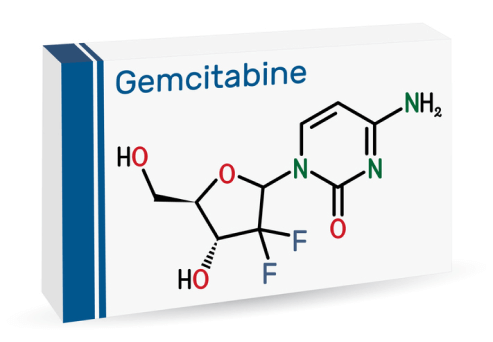Based on Your Reading:
Get a Mesothelioma Treatment Guide

Find a Top Mesothelioma Doctor

Access Help Paying for Treatment

The chemotherapeutic drug gemcitabine is most often used to treat pancreatic, ovarian and breast cancers. Doctors also found success in the treatment of pleural and peritoneal mesothelioma and certain types of lung cancer, and often use the drug in combination with another chemotherapy drug to treat these forms of cancer.

Written by Karen Selby, RN • Edited By Walter Pacheco • Medically Reviewed By Dr. Jeffrey Velotta
The Mesothelioma Center at Asbestos.com has provided patients and their loved ones the most updated and reliable information on mesothelioma and asbestos exposure since 2006.
Our team of Patient Advocates includes a medical doctor, a registered nurse, health services administrators, veterans, VA-accredited Claims Agents, an oncology patient navigator and hospice care expert. Their combined expertise means we help any mesothelioma patient or loved one through every step of their cancer journey.
More than 30 contributors, including mesothelioma doctors, survivors, health care professionals and other experts, have peer-reviewed our website and written unique research-driven articles to ensure you get the highest-quality medical and health information.
My family has only the highest compliment for the assistance and support that we received from The Mesothelioma Center. This is a staff of compassionate and knowledgeable individuals who respect what your family is experiencing and who go the extra mile to make an unfortunate diagnosis less stressful. Information and assistance were provided by The Mesothelioma Center at no cost to our family.LashawnMesothelioma patient’s daughter


Selby, K. (2024, February 2). Gemcitabine. Asbestos.com. Retrieved April 16, 2024, from https://www.asbestos.com/treatment/chemotherapy/gemcitabine/
Selby, Karen. "Gemcitabine." Asbestos.com, 2 Feb 2024, https://www.asbestos.com/treatment/chemotherapy/gemcitabine/.
Selby, Karen. "Gemcitabine." Asbestos.com. Last modified February 2, 2024. https://www.asbestos.com/treatment/chemotherapy/gemcitabine/.
Most chemotherapeutic drugs work by killing cells with complex chemical reactions. Gemcitabine can slow the growth of pleural mesothelioma by interfering with the DNA replication of cancer cells.
Gemcitabine was discovered and developed by scientists at the pharmaceutical company Eli Lilly. Gemzar is the registered name of gemcitabine for injection. Mesothelioma patients who do not tolerate platinum-based chemotherapy drugs such as cisplatin or carboplatin may do well on gemcitabine.
Gemcitabine chemotherapy is most often performed on an outpatient basis and is administered intravenously. Treatment typically involves a trip to a doctor’s office, clinic or hospital. The procedure usually takes a few hours, with the actual administration of the drug lasting around 30 minutes. In most cases, it is administered on various schedules, the most common being once a week for three weeks, followed by one week off. The length of treatment and strength of dosage that is best for your cancer doctor will determine you.
| Brand Name | Gemzar |
| Alternate Names | Gemcitabine Hydrochloride |
| Manufacturer | Eli Lilly and Company |
| Dosage | 1250 mg/m² on days 1, 8 and 15 every four weeks |
| Administration Route | Intravenous |
| Active Ingredient | Gemcitabine |
| Drug Class | Antimetabolite |
| Medical Code | J9201 |
| Interacting Drug | Flu vaccine, adenovirus types 4 and 7 live vaccines, palifermin, tofacitinib, warfarin |
| Medical Studies | Transarterial Chemoperfusion: Cisplatin, Methotrexate, Gemcitabine for Unrescetable Pleural Mesothelioma |
| FDA Warning | Pulmonary toxicity, respiratory failure, bladder toxicity, liver damage, myelosuppression, fetal harm, radiation therapy toxicity, capillary leak syndrome, posterior reversible encephalopathy syndrome |
Get a Mesothelioma Treatment Guide

Find a Top Mesothelioma Doctor

Access Help Paying for Treatment

The drug may be administered alone or in combination with another chemotherapy drug. It may be used in first-line or second-line chemotherapy regimens for mesothelioma. First-line chemotherapy with gemcitabine is often given in combination with another chemotherapy drug, such as cisplatin. Second-line chemotherapy with this drug may be administered alone or in combination, depending on the patient’s response to first-line chemotherapy.
Gemcitabine is used more often in second-line chemotherapy for mesothelioma than first-line because cisplatin and pemetrexed produce longer survival rates.
It is necessary for patients to inform their doctor of current medications being taken, including all prescription drugs and any vitamins, supplements or over-the-counter medications, before beginning gemcitabine treatment. In addition, anyone who has impaired liver or kidney function is generally not advised to use gemcitabine, because the drug can cause severe liver and kidney damage. Because gemcitabine and most chemotherapy drugs are known to harm unborn babies, pregnant women should not use these drugs.
Side effects of treatment with gemcitabine may include the following:
People treated with chemotherapy drugs have reduced immune system function because these drugs kill specific immune cells. If you take gemcitabine for mesothelioma cancer, avoid contact with people with colds or other infections. A medical face mask may be worn to protect you from contact with germs.
Several phase II clinical trials have investigated gemcitabine’s effectiveness on mesothelioma. Some phase II trials report higher response rates or overall survival rates than others. Despite inconsistent results, the consensus is that the drug benefits people with mesothelioma.
In 2002, an Australian phase II clinical trial evaluated the combination of gemcitabine and cisplatin as first-line chemotherapy for pleural mesothelioma. Researchers reported a partial response (meaning the tumor shrank by more than 30%) in 33% of participants. The tumor was stabilized (meaning no new tumor growth) in 60% of participants. Only 8% of participants had progressive tumor development while on the treatment. Participants reported improved quality of life following recovery from treatment and improved respiratory function. The overall survival from the start of treatment was 11.2 months.

In 2012, results were published from a phase II clinical trial led by mesothelioma expert Dr. Hedy Kindler on the combination of gemcitabine, cisplatin and bevacizumab (a drug that cuts blood supply to tumors). Anti-angiogenesis drugs such as bevacizumab block the formation of new blood vessels, which is the pathway through which tumors spread cancerous cells in the body.
Adding bevacizumab improved progression-free survival and overall survival in some participants, but the effect was not significant enough among all participants to warrant further study.
Gemcitabine was tested in a prolonged (over 6 hours) low-dose infusion regimen in combination with cisplatin in a 2017 study. This low-dose approach increased the effectiveness of gemcitabine against mesothelioma, although it did cause more hair loss than the average dose in 30 minutes of infusion. Overall survival was 16.16 months, which is among the longest survival times reported for mesothelioma chemotherapy.
In 2021, a research study examined the effects of combining gemcitabine with ramucirumab for mesothelioma after progression on therapy with platinum and pemetrexed chemotherapy. Ramucirumab plus gemcitabine significantly improved overall survival over gemcitabine and placebo and had a favorable safety profile.
Studies continue to investigate the best ways to administer gemcitabine for the treatment of mesothelioma. The drug’s effectiveness may be improved with the addition of other chemotherapy drugs, targeted therapies and nutrition. Trials are ongoing to improve the outcomes of people treated with the drug. People facing mesothelioma who undergo treatment with this drug may experience reduced symptoms, improved quality of life and extended survival.
Your web browser is no longer supported by Microsoft. Update your browser for more security, speed and compatibility.
If you are looking for mesothelioma support, please contact our Patient Advocates at (855) 404-4592
